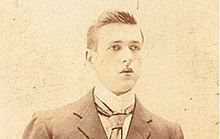Ernest Barker
Appearance

Sir Ernest Barker FBA (23 September 1874 – 17 February 1960) was an English political scientist who served as Principal of King's College London from 1920 to 1927.
Quotes
[edit]- The idea of the State is one which is little grasped in England.
- 'The "Rule of Law"', Political Quarterly (May 1914), p. 139
- Collectivism...demands expert government..."the aristocracy of talent" of which Carlyle wrote. The control of a State with powers so vast will obviously need an exceptional and exceptionally large aristocracy.
- Political Thought in England 1848–1914 (1915; 2nd edn. 1947), pp. 192-193
- It has indeed been a feature common to the Evangelical and Catholic sections of the English Church—and, for that matter, a feature common to both with various Nonconformist societies, which in this respect have followed the same tradition and adopted similar methods—that they have all sought to make religion a general social force.
- National Character and the Factors in Its Formation (1927; 2nd edn. 1928), pp. 200-201
- All in all, we may say that Nonconformity served as a gathering ground of the various influences (religious, political, and economic) which produced the Liberal or Manchester philosophy of the nineteenth century—a philosophy which not only inspired a party, but determined in no small measure the general life and aspect of Victorian England. "Way for individual enterprise"—this was its teaching; and backed by the manufacturing and commercial classes, which had always been the stronghold of Nonconformity, its teaching triumphed. The reluctant Peel, a Conservative and a Churchman, bowed to its logic; the subtle mind of Gladstone, nurtured in the same tenets as Peel, came under its influence and became its chosen apostle. The England which presented itself to the Continent—the England which the Continent still sees (though it is passing or passed)—was the England of this tradition: not the England of Church and King, the "land" and loyalty, but the England of chapel and counting-house, the factory and self-help. The philosophy of England which travelled abroad was the philosophy of John Stuart Mill and Herbert Spencer; and both, whatever their religious views, were deeply imbued with the Nonconformist tradition. Spencer, as he writes in his autobiography, sprang from a family "essentially dissenting"; and his Nonconformist instincts and early training left an abiding mark, which appears in his opposition to any scheme of State education, and in the title and whole argument of The Man versus the State.
- National Character and the Factors in Its Formation (1927; 2nd edn. 1928), p. 205
Quotes about Sir Ernest Barker
[edit]- Among Sir Ernest Barker's many interests and achievements...one was prolonged for some years after his retirement from most other activities, for he continued to work for better international understanding as a member of the United Kingdom National Commission for Unesco and as the first chairman of its National Co-operating Body for Philosophy and Humanistic Studies. To both he brought a wealth of wisdom and experience and the stimulus of all those qualities of vitality, candour and stern intolerance of nonsense so well brought out in your memoir, all of which made him so truly worthy and justly eminent a citizen of that Republic of Letters to which his life's work was devoted.
- 'F.R.C.', 'Sir Ernest Barker', The Times (February 23, 1960), p. 15
- Yet, admirable though his books are, the fact remains that the man was bigger than his books. To think of Ernest Barker is to think, first and foremost, of one who, once met, can never be forgotten, a man of surprising candour, naive curiosity, and effortless vitality. He repelled a few, attracted many, aroused the interest of all. In many ways he was an extraordinarily intelligent child, and he influenced others with the unconscious fearlessness of a child. In all that he did he was always the same, a critical yet sensitive Liberal, not particularly careful of others, yet tender-hearted, easily stirred by the plight of those in adversity, happy in phrase as in disposition, often uncannily acute, and sometimes unexpectedly perverse.
- 'Sir Ernest Barker', The Times (February 19, 1960), p. 13
- "Whenever I see a row of poplars", the much-loved tutor Ernest Barker used to say in the rich Cheshire accent he guarded so stubbornly against the corrosive influences of both Oxford and Cambridge: "whenever I see a row of poplars going on in a straight line, over hill over dale, never turning aside for forest or river, I say to myself 'The Romans! The Romans have been here! It may be sentimental, but I like it.'"
- 'Inheritors of Rome', The Times (December 8, 1960), p. 15
- It would be difficult to name another scholar whose books and articles have been and are to-day as widely read by university teachers and students of political science in the United States. American scholars have especially admired his breadth of interests, ranging from an intimate acquaintance with classical Greek, which resulted in the most useful modern translation of Aristotle's Politics, to concern with major problems of the day, reflected in his letters to the Editor of The Times.
- Harold Zink, 'Sir Ernest Barker', The Times (April 8, 1960), p. 17

